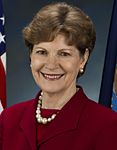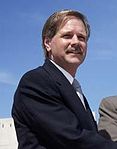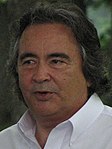2000 United States gubernatorial elections
| |||||||||||||||||||||||||||||||
13 governorships 11 states; 2 territories | |||||||||||||||||||||||||||||||
|---|---|---|---|---|---|---|---|---|---|---|---|---|---|---|---|---|---|---|---|---|---|---|---|---|---|---|---|---|---|---|---|
| |||||||||||||||||||||||||||||||
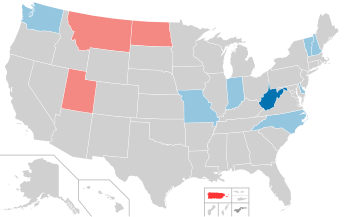 Map of the results Democratic hold Republican hold Democratic gain Popular Democratic gain Nonpartisan No election | |||||||||||||||||||||||||||||||
United States gubernatorial elections were held on November 7, 2000, in 11 states and two territories. The elections coincided with the presidential election. Democrats gained one seat by defeating an incumbent in West Virginia. As of 2025, this remains the last gubernatorial cycle in which a Democrat won in Indiana.
Race Summary
[edit]States
[edit]| State | Incumbent | Party | First elected |
Result | Candidates |
|---|---|---|---|---|---|
| Delaware | Tom Carper | Democratic | 1992 | Incumbent term-limited. New governor elected. Democratic hold. |
|
| Indiana | Frank O'Bannon | Democratic | 1996 | Incumbent re-elected. |
|
| Missouri | Roger B. Wilson | Democratic | 2000[a] | Incumbent retired. New governor elected. Democratic hold. |
|
| Montana | Marc Racicot | Republican | 1992 | Incumbent term-limited. New governor elected. Republican hold. |
|
| New Hampshire | Jeanne Shaheen | Democratic | 1996 | Incumbent re-elected. |
|
| North Carolina | Jim Hunt | Democratic | 1976 1984 (term-limited) 1992 |
Incumbent term-limited. New governor elected. Democratic hold. |
|
| North Dakota | Ed Schafer | Republican | 1992 | Incumbent retired. New governor elected. Republican hold. |
|
| Utah | Mike Leavitt | Republican | 1992 | Incumbent re-elected. |
|
| Vermont | Howard Dean | Democratic | 1991[b] | Incumbent re-elected. |
|
| Washington | Gary Locke | Democratic | 1996 | Incumbent re-elected. |
|
| West Virginia | Cecil Underwood | Republican | 1956 1960 (term-limited) 1996 |
Incumbent lost re-election. New governor elected. Democratic gain. |
|
Territories
[edit]| State | Incumbent | Party | First elected |
Result | Candidates |
|---|---|---|---|---|---|
| American Samoa | Tauese Sunia | Democratic | 1996 | Incumbent re-elected. |
|
| Puerto Rico | Pedro Rosselló | New Progressive | 1992 | Incumbent retired. New governor elected. Popular Democratic gain. |
|
Closest races
[edit]States where the margin of victory was under 1%:
- Missouri, 0.9%
States where the margin of victory was under 5%:
- American Samoa, 2.8%
- West Virginia, 2.9%
- Puerto Rico, 3.0%
- Montana, 3.9%
States where the margin of victory was under 10%:
- New Hampshire, 5.0%
- North Carolina, 5.8%
Delaware
[edit]
| |||||||||||||||||
| |||||||||||||||||
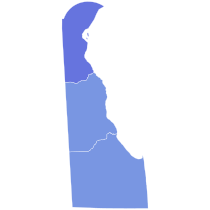 County results Minner: 50–60% 60–70% | |||||||||||||||||
| |||||||||||||||||
The 2000 Delaware gubernatorial election was held on November 7, 2000, coinciding with the U.S. presidential election. Incumbent governor Tom Carper was term-limited and instead successfully ran for the United States Senate. Lieutenant Governor and Democratic nominee Ruth Ann Minner squared off against Republican nominee John M. Burris and won in a landslide on election day.
Indiana
[edit]
| ||||||||||||||||||||
| ||||||||||||||||||||
 County results O'Bannon: 40–50% 50–60% 60–70% 70–80% McIntosh: 40–50% 50–60% | ||||||||||||||||||||
| ||||||||||||||||||||
The 2000 Indiana gubernatorial election was held on November 7, 2000. Incumbent governor Frank O'Bannon, a Democrat, was re-elected over Republican David M. McIntosh with 57% of the vote. Libertarian Andrew Horning also ran and received 2% of the vote. O'Bannon's victory was the fourth consecutive election in which a Democrat was elected Governor of Indiana, the longest winning streak for that party in the state since the Civil War. As of 2023[update], this was the last time a Democrat was elected Governor of Indiana.
Missouri
[edit]
| |||||||||||||||||
| |||||||||||||||||
 County results Holden: 40–50% 50–60% 60–70% 70–80% Talent: 40–50% 50–60% 60–70% 70–80% | |||||||||||||||||
| |||||||||||||||||
The 2000 Missouri gubernatorial election was held on November 7, 2000 and resulted in a narrow victory for the Democratic nominee, State Treasurer of Missouri Bob Holden, over the Republican candidate, U.S. Representative Jim Talent, and several other candidates. Incumbent Democratic governor Mel Carnahan was term-limited and could not run for re-election to a third term in office. However, he was killed in a plane crash on October 16, 2000, while campaigning for Missouri's Class 1 Senate seat. Lieutenant Governor Roger B. Wilson succeeded to the office following Carnahan's death.
Coincidentally, Talent would later be elected at the 2002 Senate special election and defeated Mel Carnahan's widow Jean Carnahan to begin the rest of Mel Carnahan's unexpired Senate term. This was the only time between 1968 and 2020 that the winner of the Missouri gubernatorial election did not come from the same party as the winner of the presidential election held simultaneously. This gubernatorial election was one of the closest in Missouri's history. Bob Holden did well, as expected in St. Louis and Kansas City. Talent easily won most rural parts of the state. Holden did poorly in the St. Louis suburbs. However Holden's wins in the Democratic strongholds of St. Louis and Kansas City proved to be just enough to push him over the finish line. Because the election was decided by less than 1%, Talent could have requested a recount that his campaign would have to pay for since it was not below half a percent. However, most recounts never see a swing of more than 1,000 votes, and Talent was trailing by 21,445. Talent ultimately did not request a recount and conceded defeat on the late evening of November 14.
Montana
[edit]
| ||||||||||||||||||||
| Turnout | 59.90% | |||||||||||||||||||
|---|---|---|---|---|---|---|---|---|---|---|---|---|---|---|---|---|---|---|---|---|
| ||||||||||||||||||||
 County results Martz: 50–60% 60–70% 70–80% 80–90% O'Keefe: 50–60% 60–70% 70–80% | ||||||||||||||||||||
| ||||||||||||||||||||
The 2000 Montana gubernatorial election took place on November 7, 2000. Incumbent governor of Montana Marc Racicot, who was first elected in 1992 and was re-elected in 1996, was unable to seek re-election due to term limits. Judy Martz, the lieutenant governor of Montana under Racicot for four years, won the Republican primary and advanced to the general election, where she faced Mark O'Keefe, the Montana State Auditor and Democratic nominee. Despite the fact that George W. Bush, the Republican nominee for president in 2000, won the state in a landslide, the race between Martz and O'Keefe was close. However, Martz managed to narrowly defeat him to win her first and only term as governor. This was the last time that a Republican was elected Governor of Montana until 2020, when Greg Gianforte was elected.[3]
New Hampshire
[edit]
| |||||||||||||||||||||
| |||||||||||||||||||||
Shaheen: 40–50% 50–60% 60–70% Humphrey: 40–50% 50–60% 60–70% 70–80% 80–90% >90% Tie: 40–50% | |||||||||||||||||||||
| |||||||||||||||||||||
The 2000 New Hampshire gubernatorial election took place on November 7, 2000. Incumbent Democratic Governor Jeanne Shaheen won re-election.
North Carolina
[edit]
| |||||||||||||||||
| |||||||||||||||||
 County results Easley: 40–50% 50–60% 60–70% 70–80% | |||||||||||||||||
| |||||||||||||||||
The 2000 North Carolina gubernatorial election was held on November 7, 2000. The general election was fought between the Republican nominee, former mayor of Charlotte Richard Vinroot and the Democratic nominee, state Attorney General Mike Easley. Easley won by 52% to 46% and succeeded fellow Democrat Jim Hunt as governor.
North Dakota
[edit]
| ||||||||||||||||||||
| ||||||||||||||||||||
 County results Hoeven: 50–60% 60–70% Heitkamp: 50–60% 60–70% 70–80% 80–90% | ||||||||||||||||||||
| ||||||||||||||||||||
The 2000 North Dakota gubernatorial election took place on November 7, 2000 for the post of Governor of North Dakota. Incumbent Republican governor Ed Schafer decided not to run for reelection. Republican nominee John Hoeven won the election over Democratic State Attorney General Heidi Heitkamp. Heitkamp had led in the polls until early October, when reports indicated that she had breast cancer, and would undergo surgery. She ran advertisements to assure voters she was still fit to serve; however, by the final month, Hoeven had taken a six-point lead in polling.[4] As of 2021, this is the most recent North Dakota gubernatorial election in which the Democratic nominee received over 40% of the vote. Hoeven and Heitkamp later served alongside each other in the United States Senate from 2013 to 2019.
Utah
[edit]
| ||||||||||||||||||||
| ||||||||||||||||||||
 County results Leavitt: 50–60% 60–70% 70–80% Orton: 50–60% 60–70% | ||||||||||||||||||||
| ||||||||||||||||||||
The 2000 Utah gubernatorial election took place on November 7, 2000. Incumbent Republican Mike Leavitt won reelection to a third term.
Vermont
[edit]
| |||||||||||||||||||||
| |||||||||||||||||||||
Dean: 30-40% 40-50% 50-60% 60-70% 70-80% 80-90% Dwyer: 30-40% 40-50% 50-60% 60-70% 70-80% | |||||||||||||||||||||
| |||||||||||||||||||||
The 2000 Vermont gubernatorial election took place on November 7, 2000. Incumbent Democratic governor Howard Dean won re-election. The campaign was dominated by the fallout from the passage of a civil union bill and the subsequent backlash encapsulated by the slogan Take Back Vermont. Ruth Dwyer, the Republican nominee in 1998, ran again in 2000 and was closely tied to the Take Back Vermont movement. Howard Dean, the Democratic governor, favored civil unions and was a primary target of Take Back Vermont.[5]
Washington
[edit]
| |||||||||||||||||
| |||||||||||||||||
 County results
Locke: 40–50% 50–60% 60–70% | |||||||||||||||||
| |||||||||||||||||
| Elections in Washington |
|---|
 |
The 2000 Washington gubernatorial election was held on November 7, 2000. Incumbent Democratic governor Gary Locke defeated the Republican candidate John Carlson for his second term in a landslide.
As of 2022[update], this was the earliest gubernatorial election in Washington in which both candidates are currently still living. This is the last time a Democratic nominee for governor outperformed the Democratic nominee for president in Washington. This would also be the last gubernatorial election in Washington in which the margin of victory was in double digits and in which any counties in Eastern Washington voted for a Democrat until Jay Inslee's 2020 landslide victory.
West Virginia
[edit]
| |||||||||||||||||
| |||||||||||||||||
 County results Wise: 40–50% 50–60% 60–70% Underwood: 40–50% 50–60% 60–70% 70–80% | |||||||||||||||||
| |||||||||||||||||
The 2000 West Virginia gubernatorial election took place on November 7, 2000. Incumbent Republican governor Cecil Underwood ran for re-election to a second consecutive term in office, but was defeated by Democratic U.S. Representative Bob Wise. Concurrently, the state voted for the opposite party federally, choosing Republican nominee, George W. Bush over Democratic nominee Al Gore in the presidential election that year. As of 2022[update], this was the last time in which an incumbent West Virginia Governor lost re-election.
Territories
[edit]American Samoa
[edit]| Party | Candidate | Votes | % | |
|---|---|---|---|---|
| Democratic | Tauese Sunia | {{{votes}}} | 51.4% | |
| Independent | L. Peter Reid | {{{votes}}} | 48.6% | |
| Total votes | {{{votes}}} | 100.00 | ||
Puerto Rico
[edit]
| |||||||||||||||||||||||||
| Turnout | 82.20% | ||||||||||||||||||||||||
|---|---|---|---|---|---|---|---|---|---|---|---|---|---|---|---|---|---|---|---|---|---|---|---|---|---|
| |||||||||||||||||||||||||
 Results by municipality Calderón: 40-50% 50-60% Pesquera: 40–50% 50–60% | |||||||||||||||||||||||||
| |||||||||||||||||||||||||
See also
[edit]Notes
[edit]- ^ Wilson took office after his predecessor (Mel Carnahan) was term-limited but died from a plane crash.
- ^ Dean took office after his predecessor (Richard Snelling) died. He was subsequently elected in the 1992 Vermont gubernatorial election.
References
[edit]- ^ "Our Campaigns - AS Governor Race - Nov 07, 2000".
- ^ "Montana Voter Turnout". Montana Secretary of State. 22 February 2018. Retrieved 2022-05-26.
- ^ "GOP Rep. Greg Gianforte wins Montana governor's race |". The Hill. Archived from the original on 2020-11-04. Retrieved 2020-11-04.
- ^ Janofsky, Michael (7 November 2000). "THE 2000 ELECTIONS: RACES IN THE STATES; With 11 Governorships Being Contested, Democrats Win 7, Some in States Bush Won". The New York Times. Retrieved 22 August 2016.
- ^ Ellen Goodman (November 5, 2000). "'Take Back Vermont,' the signs say, but take it back to what?". The Boston Globe.









